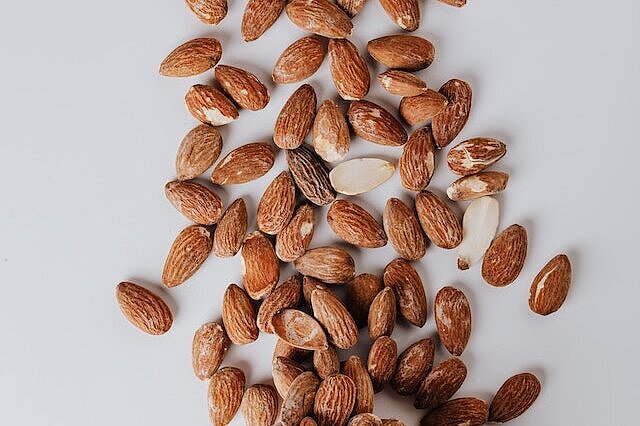Marzipan

Marzipan is a sweet confection consisting mainly of ground almonds and sugar or honey. Often enriched with rosewater or other flavorings, it is known for both its smoothness and malleability, making it a popular decoration on cakes and other baked goods. While marzipan is widely used in the human diet, assessing its safety for dogs requires careful consideration of its ingredients and potential health effects.
What is marzipan?
Marzipan is traditionally made by finely grinding almonds into a paste, which is then mixed with sugar or honey. This mixture is often heated until it forms a smooth, kneadable mass that can easily be molded into different shapes or used as a filling. The quality and taste of marzipan can vary depending on the ratio of almonds to sugar and the additives used.
Benefits of marzipan for dogs
Almonds as a source of protein
Almonds contain proteins that could potentially be beneficial for dogs in small amounts. Protein is necessary for building and maintaining muscle tissue as well as many other vital functions in the body.
Disadvantages and precautions
Sugar content
Marzipan contains a high amount of sugar, which can be harmful to dogs. High sugar consumption can lead to weight gain, dental problems and even diabetes in susceptible animals.
Potential toxicity of almonds
Although almonds are not toxic to dogs, they can be difficult to digest in large quantities and can lead to gastrointestinal problems. There is also a risk of aspiration, especially in smaller dogs.
Flavors and additives
Some types of marzipan contain added flavors or alcohol, which can be harmful to dogs. Ingredients such as chocolate, which is sometimes used in conjunction with marzipan, are toxic to dogs.
Although the almonds contained in marzipan are not necessarily harmful to dogs in small amounts, the high sugar content and potential additives make it an unsuitable choice for your dog's diet. The risks associated with eating marzipan far outweigh the minimal benefits it might offer. As a responsible pet owner, it's important to opt for safer and healthier treats designed specifically for dogs. After all, the health and well-being of our best friend is of paramount importance, and choosing the right diet plays a crucial role in this.
If you notice any signs of hypersensitivity or poisoning in your dog, you should see your vet immediately. We are not a substitute for a vet, but we try to be as accurate as possible. Every dog reacts differently and we recommend you get a second opinion or consult your vet if in doubt.
Stay healthy and take good care of your four-legged friend!😊
Similar to Marzipan
Fondant, often found in two main varieties - rolled fondant and poured fondant - is a sugar paste consisting mainly of sugar, water, glucose syrup and gelling agents. Roll fondant is used to...
Almonds are the seeds of the almond tree, which belongs to the rose family. They grow in a hard shell that must be removed before consumption. There are two types of almonds: sweet almonds and...
Ganache is a smooth mixture traditionally made by mixing chocolate with warm cream. The ratio of chocolate to cream can vary depending on whether a firm, soft or liquid consistency is desired....
Buttercream, a staple in confectionery, is a sweet, airy mixture consisting mainly of butter and powdered sugar. Depending on the recipe, milk, cream, flavorings and colorings can also be added to...



